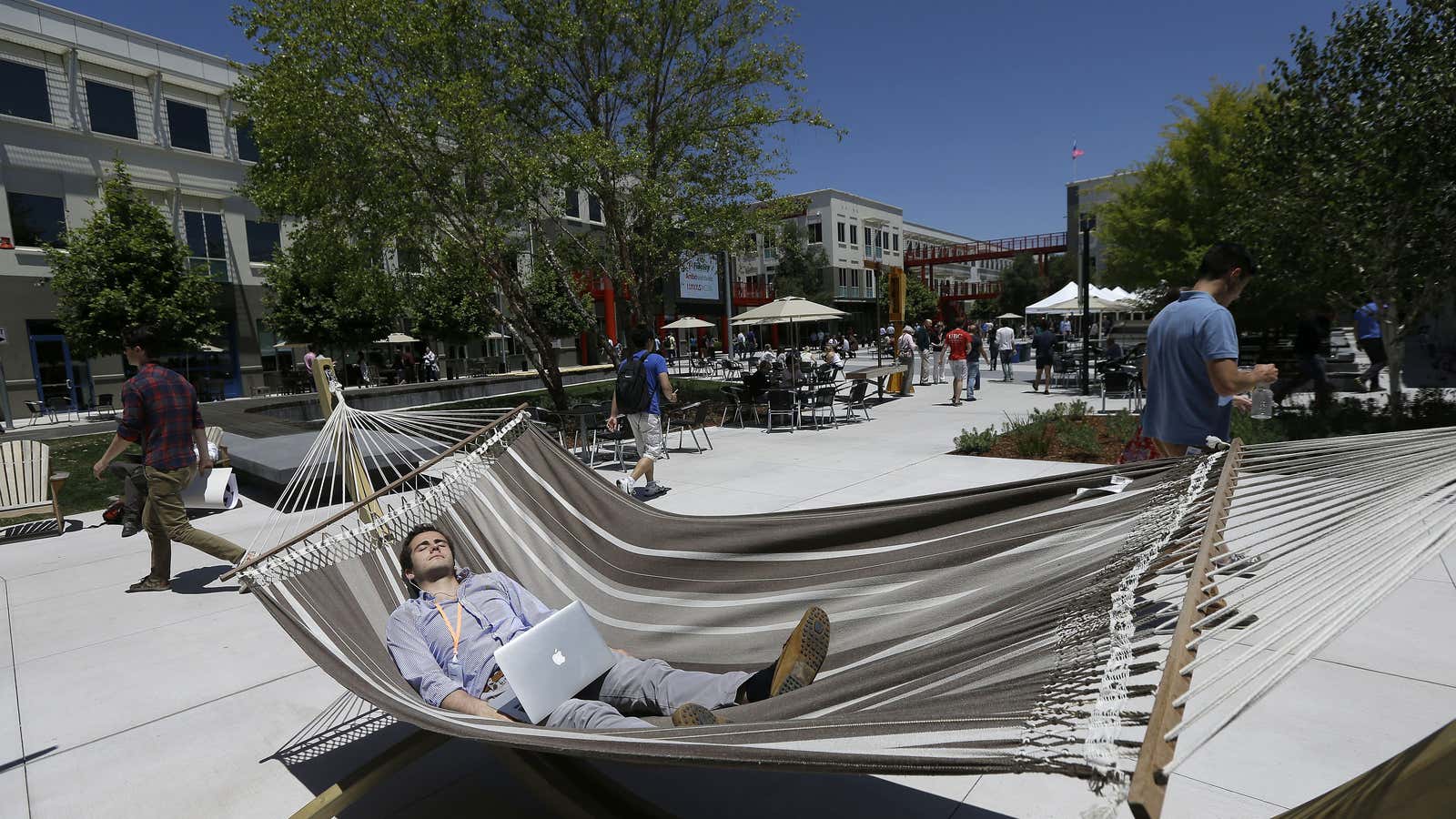For about a week and a half into his new job as an art director at Sonos, a smart speaker brand, Randall Parrish got a taste of the California company’s headquarters office in Santa Barbara, which came with kombucha, cold brew, gaming, rental bikes, shower rooms, and catered lunches every Friday.
But when the 1,500 employees of Sonos went fully remote amid the coronavirus lockdowns, getting acclimated to a new corporate culture came down to “this energy that you only know through your sofa and Slack,” he says. “It just does not quite help build a long-term relationship with that culture bonding that you’re probably hoping for.”
Linda Li, meanwhile, misses the free food at Facebook, where she’s a software engineer. Having access to ready-made meals and snacks without stepping outside of the office was both a privilege and, as she describes it, a set of “golden handcuffs” that allowed her to focus even more on work without much context switching, she says. “You don’t want to leave, because they take away a lot of the things that normal adult humans have to worry about,” she says.
These days she is doing more of her own meal-prep and feels fortunate to have roommates “who are really good at cooking.”
Since the dot-com boom, trendy tech companies have been known for providing not only big paychecks but also lucrative perks to lure the talent needed to fill an expanding set of roles in emerging fields.
But in a post-pandemic world, the Silicon Valley standard office perks of all-you-can-eat buffets and high-tech gyms are no longer very workable—not with social-distancing in place.
If perks are no longer part of the attraction, Covid-19 could also level the playing field for tech companies when it comes to finding talent. “It’s really comfortable to be in the office,” says Li. “I guess if there were no perks then I would probably think more seriously about switching jobs.”
Perks no more?
Already, companies with industry-leading perks, such as Facebook and Google, have made the call that employees can work from home until at least the end of 2020. Without a traditional office environment to offer workers and prospective recruits, Covid-19 is forcing employers to think about crafting perks that align better with an online community, says Dave Berndt, senior human resources advisor at HR outsourcing firm G&A Partners, citing telemedicine as an example.
“I don’t think [physical] perks will be completely closed off in the future office,” says Berndt. But companies “will have to become more flexible to accommodate changing attitudes and policies” for those who need to be in the office on a consistent basis versus those who don’t.
What about the catering?
As tech companies start envisioning what the office will look like in a post-pandemic world, the office-catering companies that fuel Silicon Valley’s corporate campuses are coming up with plans for re-opening.
Already it’s clear that employees won’t be coming back to the lavish self-service buffets they were used to. Gavin Crynes, a co-founder and COO of Fare Resources, an office-catering company, says it will be pivoting to individually packaged meals for corporate clients like Salesforce.
He also anticipates more traditional cafeteria offerings—packaged snacks and drinks instead of bulk snacks and communal beverage taps, for example—to help enforce hygiene rules and safe sanitation. (Previously, his company aimed to eliminate snacks and drinks in single-serve packages, in an effort to decrease waste.)
Meanwhile, 415 Catering, which works with roughly 20 Bay Area tech companies, is re-creating office food perks for a virtual setting. The company is shipping out meal kits for virtual happy hours and town-hall meetings. It’s also providing video cooking tutorials to teach tech workers—who perhaps did not need to cook much pre-crisis—a skill or two.
